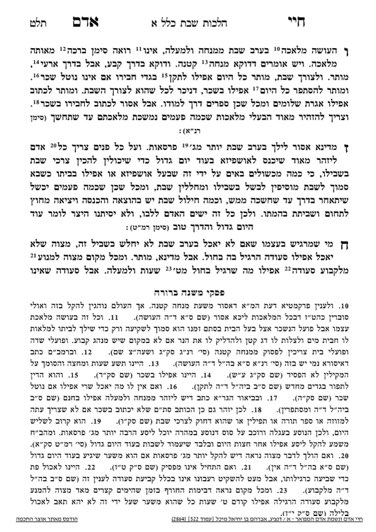We are continuing in siman 7, where the Chayei Adam is discussing the issues with traveling on erev Shabbos. The Gemara says one can travel up to 3 parsah on erev Shabbos, which, as we learned yesterday, allows one to travel for approximately the first third of the day. This comes out to approximately four hours; meaning, if one begins traveling at 6am, they should stop by 10am.
However, as we pointed out, the case of the Gemara is where one is traveling by foot. The Mishnah Berurah discusses one traveling in a wagon. If we are able to translate the distance to time, as we did above, iit would seem that we should be able to do so for animal or car travel as well, and allow a person to travel up to four hours regardless of the distance.
However, the Bach holds this is incorrect, and actually allows one to travel even further once they are in a wagon (i.e, by vehicle). The Pri Megadim explains that the difficulty of walking by foot–hills, holes, exhaustion of walking, and so on–was taken into account by Chazal when limiting travel to 3 parsah. Since these issues are avoided when traveling by vehicle, one can travel even longer, and can travel even after chatzos.
Another concern we learned yesterday was the concern that a person would need time to recover from their trip before Shabbos. That concern is much more significant when traveling by foot; when one is a passenger in a vehicle, or even a driver, that concern is not as present.
A final concern we learned was when the hosts are not aware that the guest is arriving, so they do not know to prepare for him. If the concern is that there will not be sufficient food for the guest, if the guest can contact their hosts, there is no concern. Since one can call the hosts to inform them of their arrival, they can travel even after chatzos.
Additionally, we mentioned that nowadays, people tend to prepare extra food. Baruch Hashem, we are blessed with the luxury of being able to prepare extra, so there is yet another reason not to be concerned for a lack of food.
Even with these three reasons taken into account, the Chayei Adam exhorts that one should still make sure they have time to arrive well before the end of the day. He explains that there are other, practical concerns to take into account. The host may feel compelled to cook extra food (even though technically they have enough), and end up cooking on Shabbos. Alternatively, the traveler may get stuck on the road and it could be a cause for chillul Shabbos. The Chayei Adam discusses that if they are traveling on a wagon, although there may be no chillul Shabbos in being a passenger in a wagon, once they arrive at their host, there may be issues of hotza’ah in transferring items from the wagon to the house. There may also be techum issues regarding coming into the city. There may be issues of shevisas beheimah in causing the animal to pull the wagon. Certainly, nowadays, we would be concerned for the issurim deoraysa involved in driving in a car.
The Chayei Adam concludes by writing that a person should take these concerns to heart, and not be influenced by the yetzer hara saying that there is still plenty of time left to the day. A person should rather pause somewhere safe on their trip, and, assuming they have minimal food or can obtain food, should spend Shabbos on their own rather than pushing to reach their destination. Nowadays, we would add the concerns of traffic and car problems as well.
If a person is traveling for the purpose of a mitzvah, the Mishnah Berurah writes that one can be lenient to travel later in the day, but the exhortation of the Chayei Adam will still apply.
Summary
The specific concerns of Chazal in regards to traveling on erev Shabbos can be mitigated nowadays, because;
- We are not traveling by foot
- We can contact the host that we are coming
- People tend to prepare extra food for shabbos.
One may travel later in the day for mitzvah purposes. But see below.
Although the concerns mentioned by the Gemara regarding traveling on erev Shabbos can be alleviated, one should still avoid travel later in the day on erev Shabbos due to other concerns of the hosts cooking on Shabbos, or other melacha which may become necessary in arriving.
One should avoid being influenced by the yetzer hara and traveling in a way which may cause them to arrive in a bedieved manner.



